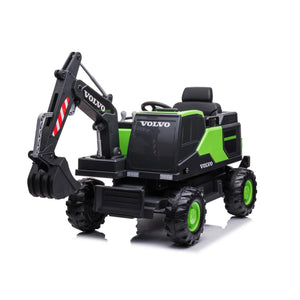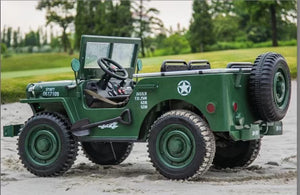
One of the best things about ridable toys for children is the fact that they are fun no matter the age of your child. If a child is old enough to sit up, they’re old enough for a ride-on. Of course, depending on their age, the kind that will work best for them will vary drastically. That’s why we’ve put together an overview of ride-ons for different age groups. That way, you can get the one that will work best for your child.
As a side note, while it may be tempting to get your kid one that’s for the next age group up so that they can grow into it, we’d highly recommend against that. These toys are made specifically for kids of a particular age and size, so getting them one that is too big could result in them hurting themselves due to not being well-secured in the seat.
Ages 0-2
Even though babies don’t have the motor skills to drive an electric toy car, that doesn’t mean they can’t enjoy the thrills of a ride-on. When a very young child isn’t in their stroller, it’s common for their parents to use something else to push or pull them around since no one wants to carry their little one around all day while they’re out.
For this, many parents use wagons or other types of carts that they can pull behind them, but if they want something a little more fun, there are push ride-on cars on the market as well. They are much more fun for the youngster. Plus, it will make it easier for parents to keep an eye on them since their kid will be in front of them the whole time.
Ages 1-4
Even though parent-powered ride-ons are suitable for kids up to the age of two, those who are at least one are often capable enough to drive their own electric car as long as it’s on flat ground. You’ll want to make sure that their vehicle can’t go over about 3 miles per hour, so getting a low-strength battery should be the primary focus for this age range.
However, some parents feel like these cars go too fast for their young ones. Unfortunately, 6V batteries are the weakest ones available, so if you want to slow them down a bit more, you can build a stopper to place behind the pedal to keep your kid from pushing it down all the way.
In terms of keeping your kid safe, though, you’ll also want to ensure that seatbelts come preinstalled on the model you buy, as well as giving them the proper protection like a helmet and elbow pads. Despite all that, the best way to keep them safe is to get a ride-on that comes with a parental remote. That way, you can control the vehicle from a distance in case they start heading toward something dangerous.
Since kids in this age range don’t have much of a preference on style or things they like quite yet, you’ll probably be safe to get them any color or car type that you want. They’ll care way more about riding it than how it looks. Just make sure it’s not too big so that they don’t slide around in it too much.
Ages 4-7
However, as your kids get older, they’ll start to care very much about how their electric ride-ons look. Maybe they want one that looks like a fast sports car or possibly a motorcycle with training wheels. Some might even want one that looks like a service vehicle so they can play pretend with their friends while using it. Regardless of the style they want, the color will be even more important. Almost all kids have a favorite one by this age, so you won’t want to disappoint.
Once we get past how the car looks, we need to focus on the features it’ll have. Kids love ride-ons that have working lights and Bluetooth capabilities so that they can listen to tunes as they drive. Some cars for this age range even come with working touch screens that can play cartoons and educational shows for your kid to watch. Just make sure they don’t use it while they drive. If that sounds like a feature your child would like, we have a selection of Power Wheels with touch screens that we’re sure they’d enjoy.
We almost forgot the most crucial aspect, though: the speed. Now that your kid is older, they can typically safely handle a toy car that can go up to 5 miles an hour. That means they’ll need one with a 12V battery. If they’re closer to six or seven, you can possibly get away with a 24V one, but those can go up to 9 or 10 miles an hour. We’ll leave that up to your discretion based on how careful your child is.
This is also the age range that you could probably get them a vehicle that can go off-road. Not all ride-ons need to stay on the sidewalk. If they have large, grooved wheels, your child will easily be able to drive them through the grass and over small hills.
Ages 7-11
For the final section of our overview of ride-ons for different age groups, we’ve got the toys for the big boys and girls. This is where most of the really cool ride-ons start to make an appearance. Obviously, your kids will want the fastest thing on the market. While the 24V models are great for speed and power, a few companies make ones that go up to 36V. These can go over 15 miles an hour at times, so make sure your child is well-protected if you get them one of these.
Even if you play it on the safer side and get them a 24V version, they’ll still have a lot of fun. Many of the go-cart and motorcycle variations have models in this battery range focused on speed and maneuverability—your kid will be able to tear up the sidewalks on these babies. Plus, some of the ride-ons for this age range even have the capability to drift, adding more points to the overall fun level.
One of the key things to look for when buying a ride-on for kids in this age group is a car with a long battery life. Young children don’t mind if their driving session lasts less than an hour, but once they’re old enough to be riding these cars around with their friends, the last thing they want is for it to die before everyone else’s. That’s why getting one with a high-capacity battery is a must.






















